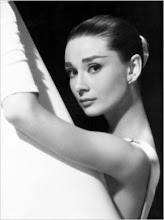I am usually disappointed when I watch a movie adaptation after reading a book. But not with "War and Peace". I was almost giggling at how succinctly characters explained how they were feeling compared to the pages and pages and pages of description in the book. In my view, the film's writers did a great job of capturing many of the key elements in the book, and for those who want to know the epic tale without investing a month of valuable reading time, I would strongly recommend the film.
 It didn't hurt that Audrey Hepburn was absolutely adorable in the role of Natasha. Although she was 26 years old in real life, and married to her co-star Mel Ferrer, she portrayed a 16 to 18-year-old in love far better than Tolstoy was able to in his writing. And one of the scenes -- a cavalry charge with perhaps a thousand riders galloping past, and shot in "Vistavision" -- was damned impressive, especially since none of the soldiers were computer-generated.
It didn't hurt that Audrey Hepburn was absolutely adorable in the role of Natasha. Although she was 26 years old in real life, and married to her co-star Mel Ferrer, she portrayed a 16 to 18-year-old in love far better than Tolstoy was able to in his writing. And one of the scenes -- a cavalry charge with perhaps a thousand riders galloping past, and shot in "Vistavision" -- was damned impressive, especially since none of the soldiers were computer-generated. And one thing about the movie made me feel more forgiving about the book -- parts of the movie were quite dated. Some of the scenes were so clearly shot on a cheap sound stage that Tom and I couldn't help laughing. And the special effects were primitive compared to today's -- explosions that were mere flashes of light, cannons that failed to recoil after firing, deaths that were bloodless.
But the fact is that the movie was made more than 50 years ago, and a great deal of film-making innovation has happened since then.
Perhaps in the same way, the book "War and Peace" simply is somewhat dated. Like film-making, writing styles and modes of expression have evolved in the more than 150 years since it was written. Indeed, at the time it was first published, "War and Peace" actually was considered a truly modern book -- one that portrayed a more realistic world than was common in the romantic and picaresque novels of the time. Through my 21st-century eyes, this once important book seemed repetitive and often pedantic. But perhaps the simple fact is that it, understandably, is no longer modern.
And I am glad I read it. Not only can I say that I have read "War and Peace" and even enjoyed parts of it, the book also helped me get though a stressful month.
Now, I'm excited to get to work on the next chapter in my life!

















